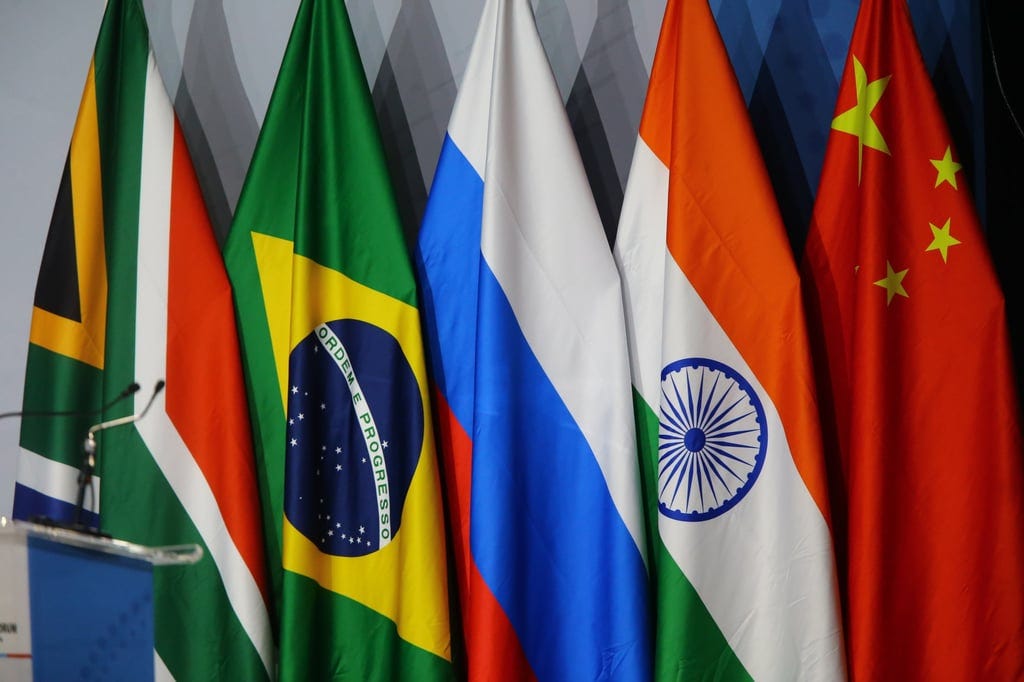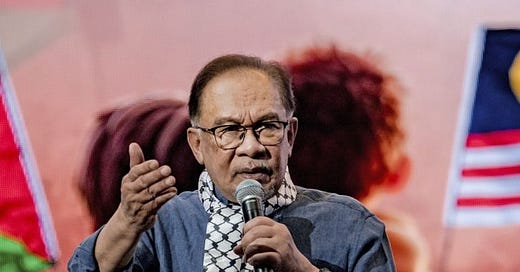Anwar Centre Stage
Anwar last Friday announced his visit to Vladivostok to meet Russian President Vladimir Putin in the “coming weeks”, following a trip by Moscow’s Foreign Minister Sergey Lavrov to Kuala Lumpur.
Anwar’s Russia trip, BRICS+ bid show Malaysia is ‘picking a side’ in power rivalry:
Plans by Malaysia’s Prime Minister Anwar Ibrahim to visit Russia as he energises a bid to join the BRICS+ group of nations show his country joining sides in the struggle between world powers, analysts say, warning it plays into the hands of Moscow as it seeks new allies away from condemnation of its invasion of Ukraine.
Anwar last Friday announced his visit to Vladivostok to meet Russian President Vladimir Putin in the “coming weeks”, following a trip by Moscow’s Foreign Minister Sergey Lavrov to Kuala Lumpur.
During that July 28 visit, Malaysia formally applied to join the BRICS+ intergovernmental organisation, which Russia currently helms as president.
BRIC, whose acronym leans on its founding members Brazil, Russia, India and China, was established in 2009 as a cooperation platform for emerging economies. South Africa joined the bloc in 2010, and it has now been expanded to include Iran, Egypt, Ethiopia and the United Arab Emirates.

Despite Anwar framing it as a continuation of Malaysia’s long-held principle of neutrality in foreign policy, geopolitical expert Tunku Mohar Mokhtar at Kuala Lumpur’s International Islamic University said the application would only reinforce the perception that Malaysia’s stance had shifted.
“Joining an economic coalition to rival G7 is obviously picking a side,” Tunku Mohar told This Week in Asia.
While Malaysia could benefit from greater access to the markets of Brics’ member states, this may negatively affect the country’s existing ties with the West, he added.
“Depending on BRICS+’ reactions to the Western-dominated global economic system, particularly the G7 or other institutions, we might see pushbacks, including trade and divestment barriers,” he said.
Anwar has restated Malaysia’s policy as openness and pragmatism in consideration of “whatever” can drive further economic growth and underpin a post-pandemic recovery.
“We take an approach that is very open to being friends with everyone and trading with everyone as long as we remain a free, independent, and sovereign nation,” Anwar said, adding that his discussion with Putin would revolve around economic matters.

The prime minister’s agreement to visit comes after Malaysia reportedly declined several earlier invitations from Moscow, which is seeking allies as its invasion of Ukraine grinds on.
Foreign Minister Mohamad Hasan told parliament that such visits needed to be carefully considered.
“We cannot simply go when we receive an invite,” Mohamad Hasan told the house.
“We do not want to be dragged into world politics that is more complex, that will create problems with our relations to other countries.”
Geopolitics expert Chong Yew Keat from Universiti Malaya said Malaysia’s Brics ambition hinged on Russia’s support.
For Russia the opportunity is “to play a stronger role in expanding its presence and trying to present a different narrative and perspective in differentiating itself from the US and, to a certain extent, China”, Chong added.
During his visit to Kuala Lumpur, Russian Foreign Minister Lavrov criticised the United States for attempting to escalate tensions in the region, particularly around the Taiwan Strait and in the South China Sea.
“The Americans are setting these countries up for confrontation and ultimatums against China. That is no good,” Lavrov said.
Other experts argue Malaysia’s cuddling up to Russia as it seeks Brics membership should not be interpreted as anything more than a natural defence of its own interests.
“India, South Africa and Brazil are founding members and they’re not regarded as anti-West,” John Pang, senior fellow at China-aligned Belt and Road Initiative Caucus for Asia Pacific, told This Week in Asia.
“No country wants to conduct its foreign policy on ‘you’re either with us or against us’ terms,” he said.
“It commits one to a network of entanglements and tripwires that raise the risk of war and drastically reduce one’s strategic autonomy and space for manoeuvre.”









